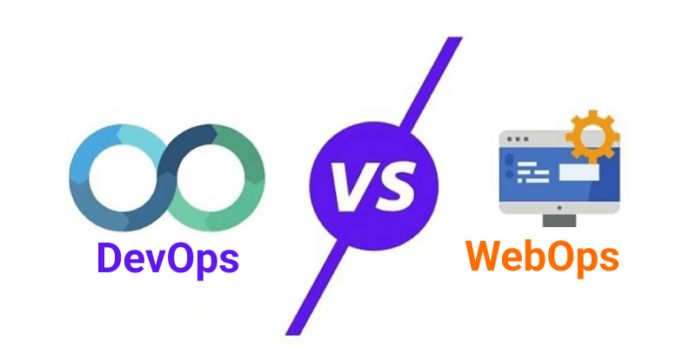In the engineering field, the word DevOps is unavoidable. While most businesses have yet to implement a completely mature DevOps system, there is no longer any doubt that it is a good idea. When teams use a DevOps methodology, they can push updates to production considerably more frequently, go from committing to deploy in seconds and recover from downtime in minutes rather than hours. There are courses that are available online like DevOps Training in Hyderabad that would assist the aspirants in developing the necessary skills on DevOps to improve their knowledge and gain practical exposure on the subject.
Your company is probably striving toward a mature DevOps strategy, no matter where it is right now. But this isn’t the place to discuss DevOps… WebOps is what we’re here to discuss. So what is the difference?
What exactly is DevOps?
DevOps is a term that refers to combining software operations and software development into a single team that is responsible for the entire application lifecycle. Most software developments used to be done in a “Waterfall” method before DevOps. This term was introduced as responsibility for an application or feature in development was passed down from one group to the next, with no interaction between them even during the handoff.
Developers construct the code that would become an application in a Waterfall approach, whether it’s an internal application’s feature or a customer-facing application such as a website. They would give over the code to operations engineers once it had been written and tested. Operations would then be responsible for deploying the new feature, ensuring that it worked properly, and monitoring the applications for errors. Operations engineers were the ones that were roused up in the middle of the night if there was an issue.
In an ideal DevOps environment, software development is done by a product-oriented team that is responsible for writing the code, running the essential tests, ensuring all technical resources are in place, deploying the application, and dealing with any issues that arise. In practice, most organizations deploy DevOps in an incomplete or inconsistent manner. The objective is always the same, though: make better software faster.
DevOps refers to the organization of the complete software organization, from physical space reorganization to the skill sets anticipated for a software development team. Rather than a job description, it’s more of an organizational structure.
What exactly is WebOps?
Website Operations, or WebOps, is related to DevOps but is both broader and narrower. As WebOps teams are solely focused on websites, it is narrower. It’s broader because WebOps brings together a greater range of responsibilities, including product owners, marketers, web developers, designers, content editors, and other marketing stakeholders. DevOps brings together a more focused set of responsibilities in software operations teams and software development that are responsible for a much broader range of software projects, from corporate applications to back-end services.
WebOps is a streamlined version of DevOps that encompasses the complete Web Team.
Comprehending WebOps
Some may claim that WebOps is a part of the DevOps movement, however, this isn’t exactly correct. DevOps is all about significantly reorganizing how engineering teams collaborate to build better software, quicker. WebOps focuses on a single thing: Creating the greatest possible website experience. To do so, you’ll need a cross-functional team that includes one or more people who are familiar with the website’s technological underpinnings.
The operation of a website necessitates specific engineering skills. The team must bring together all components of the web application, including the environment in which it runs, design elements, content, databases, real code, and success metrics, and ensure that everything functions smoothly throughout the lifecycle of a website.
As it focuses on one of the most visible components of the application suite: the website, WebOps is one of the most important disciplines associated with software engineering. As websites are frequently income-generating, any production bottlenecks are sometimes connected to a particular dollar amount in revenue lost.
WebOps teams have the following key responsibilities:
- Defining metrics for success. Connecting Google Analytics could be an easy solution. A/B testing and other experiments will be carried out by advanced teams with developers and marketers working closely.
- Develop, test and deploy web applications.
- Creating a design system that is easy to maintain, versatile, and understandable.
- Websites are being monitored for both errors and performance.
- Fixing any production-related bugs or performance concerns.
- Working within content management systems such as WordPress and Drupal to ensure load-balancing is configured properly and to upgrade the website regularly.
- Comprehending which technologies to use to improve the team’s agility and the website’s performance.
WebOps engineers are held to high standards in general.WebOps developers, even more than full-stack engineers, are required to have a deep and broad knowledge. In addition, WebOps engineers are required to oversee a larger amount of the website’s lifetime than even a DevOps team, because they must collaborate with business stakeholders more closely.
Collaboration with a Business
One of the things that distinguish WebOps from DevOps, particularly at the senior level, is the requirement to concentrate not just on optimizing for technical requirements like availability or performance, but also on keeping the business objectives in mind. Web operations are responsible for managing one of the company’s most valuable assets, and those in charge of making changes to the website must maintain frequent contact with other departments.
A member of a successful WebOps team will think about his or her work differently than the average developer, much as DevOps needs both an organizational and cultural transformation. Many developers are more concerned with building functionality than with thoroughly knowing the business rationale. WebOps developers, on the other hand, collaborate with marketing, sales, and other business stakeholders to comprehend how the website meets or fails to fulfill the needs of the company.
WebOps engineers are distinguished by their close contact with business stakeholders. While DevOps considers a wider portion of the website lifecycle than a developer or operations engineer would in a Waterfall method, it doesn’t always handle the business logic at the start and the customer adoption narrative at the end.
A competent WebOps team must comprehend not only the technical requirements of keeping a website up and running but also how to use the website to achieve marketing objectives.








